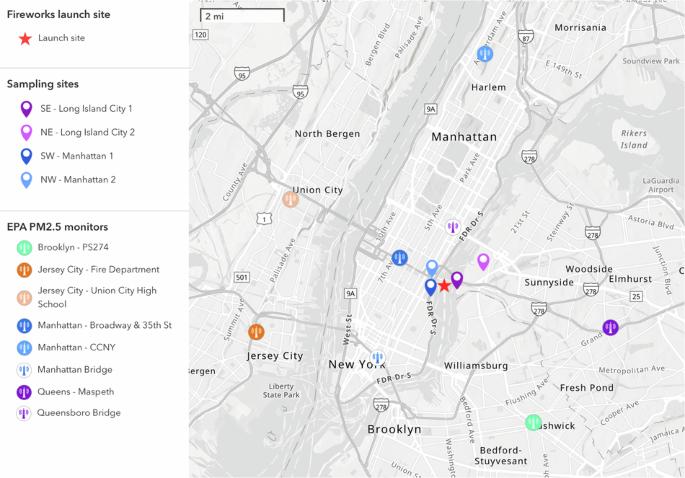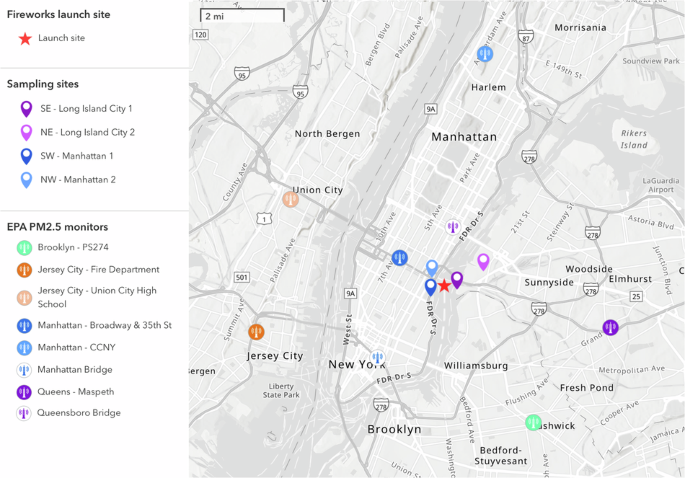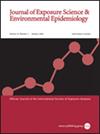飙升的污染:评估纽约市 7 月 4 日烟花的环境命运。
IF 4.7
3区 医学
Q2 ENVIRONMENTAL SCIENCES
Journal of Exposure Science and Environmental Epidemiology
Pub Date : 2024-08-06
DOI:10.1038/s41370-024-00701-x
引用次数: 0
摘要
背景:烟火表演通常会导致空气质量显著恶化。对烟花产生的污染物的广泛环境归宿--涉及空气、水和时空分析--还很少进行调查:本研究考察了美国最大的烟花活动所产生的污染物的环境归宿:方法:实时 PM2.5 和重力测试:方法:在纽约市东河沿岸收集实时 PM2.5、重力 PM2.5 和 PM10。对空气中的颗粒物进行了痕量元素(X 射线荧光)以及有机碳和元素碳(OC/EC)分析。通过 ICP-MS 对河水样本进行了重金属水污染评估。利用美国环保署和 PurpleAir 监测网络报告的纽约市和其他 5 个主要大都市地区的 PM2.5 浓度进行了时空分析:焰火活动导致河流附近采样点的 PM2.5 质量浓度大幅上升。虽然背景控制 PM2.5 为 10-15 微克/立方米,但一个地点的实时 PM2.5 峰值超过了 3000 微克/立方米,另外两个地点超过了 1000 微克/立方米。烟花活动期间的 PM2.5 和 PM10 综合重量浓度分别为 162 至 240 微克/立方米和 252 至 589 微克/立方米。烟花活动后采集的河水样本中,锌、铅、锑和铜的含量增加了一倍多,而烟花活动中空气传播的 PM2.5 中,S、K、Ba、Cu、Mg、Fe、Sr、Ti 和 Zn 的含量也有所增加。纽约市和其他大都市地区的超本地监测网络的数据显示,PM2.5 水平也有类似的增加,但一般较小:影响:烟花表演与环境污染有关。这项综合分析通过空气、水和超本地时间特征,考虑了美国最大的年度烟火表演所产生的污染物的归宿。本文章由计算机程序翻译,如有差异,请以英文原文为准。


Skyrocketing pollution: assessing the environmental fate of July 4th fireworks in New York City
Pyrotechnic displays often lead to significant increases in poor air quality. The widespread environmental fate—involving air, water, and spatial-temporal analyses—of fireworks-produced pollutants has seldom been investigated. This study examined the environmental fate of pollutants from the largest fireworks event in the U.S.: Macy’s Fourth of July Fireworks show in New York City (NYC). Real-time PM2.5 and gravimetric PM2.5 and PM10 were collected at locations along the East River of NYC. Airborne particles were assayed for trace elements (X-ray fluorescence) and organic and elemental carbon (OC/EC). River water samples were evaluated by ICP-MS for heavy-metal water contamination. Spatial-temporal analyses were created using PM2.5 concentrations reported by both EPA and PurpleAir monitoring networks for NYC and 5 other major metropolitan areas. The fireworks event resulted in large increases in PM2.5 mass concentrations at the river-adjacent sampling locations. While background control PM2.5 was 10–15 µg/m3, peak real-time PM2.5 levels exceeded 3000 µg/m3 at one site and 1000 µg/m3 at two other locations. The integrated gravimetric PM2.5 and PM10 concentrations during the fireworks event ranged from 162 to 240 µg/m3 and 252 to 589 µg/m3, respectively. Zn, Pb, Sb, and Cu more than doubled in river water samples taken after the event, while S, K, Ba, Cu, Mg, Fe, Sr, Ti, and Zn increased in airborne PM2.5 from the fireworks. Data from hyperlocal monitoring networks for NYC and other metropolitan areas yielded similar, but generally smaller, increases in PM2.5 levels. Fireworks shows have been associated with environmental contamination. This comprehensive analysis considers the fate of pollutants from the largest annual U.S. pyrotechnic show through air, water, and hyperlocal temporal characterization.
求助全文
通过发布文献求助,成功后即可免费获取论文全文。
去求助
来源期刊
CiteScore
8.90
自引率
6.70%
发文量
93
审稿时长
3 months
期刊介绍:
Journal of Exposure Science and Environmental Epidemiology (JESEE) aims to be the premier and authoritative source of information on advances in exposure science for professionals in a wide range of environmental and public health disciplines.
JESEE publishes original peer-reviewed research presenting significant advances in exposure science and exposure analysis, including development and application of the latest technologies for measuring exposures, and innovative computational approaches for translating novel data streams to characterize and predict exposures. The types of papers published in the research section of JESEE are original research articles, translation studies, and correspondence. Reported results should further understanding of the relationship between environmental exposure and human health, describe evaluated novel exposure science tools, or demonstrate potential of exposure science to enable decisions and actions that promote and protect human health.

 求助内容:
求助内容: 应助结果提醒方式:
应助结果提醒方式:


